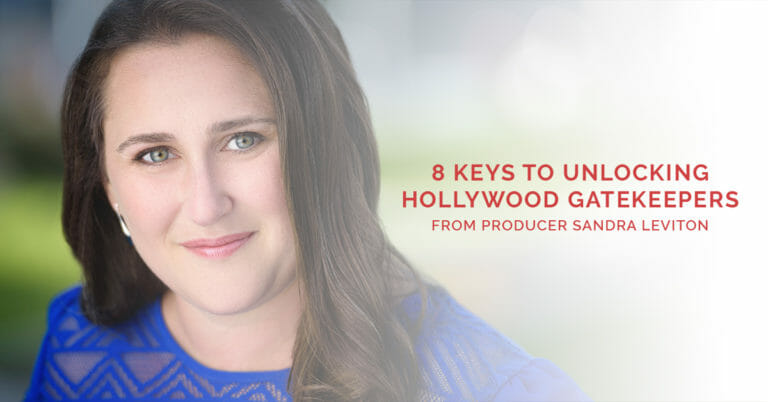Sign up for the
TSL Newsletter
and get $50 off Final Draft 12
By Rebecca Norris · January 25, 2019

Ah, Hollywood gatekeepers. They hold the keys to the kingdom of agents, managers, producers, and executives that every writer is trying to connect with, but they remain famously elusive. Where can you find these gatekeepers? How do you connect with them? And what do they even do?
In her new TSL 360 video, producer and former Hollywood gatekeeper, Sandra Leviton outlines fantastic strategies for identifying gatekeepers, connecting genuinely, building rapport, and developing high-level relationships that can advance your career. Sandra shares her wealth of knowledge from 18 years of experience working in the current programming department at FX, in the TV lit department at Paradigm agency, and at her own company, Under the Stairs Entertainment, where she consults for clients including AMC Network and Walden Media.
If you don’t already have a TSL 360 membership, be sure to join TSL 360 for a FREE 3-day trial membership! TSL 360 is the LARGEST screenwriting education content library where you can learn from the best in the biz, featuring dozens of masterclasses, deep-dive interviews and lectures from Academy Award-winning screenwriters, Emmy-winning TV writers, producers, agents, major studio executives – all in one place.
Here are the 8 keys to unlocking Hollywood gatekeepers from producer Sandra Leviton.
To find gatekeepers in Hollywood, Sandra suggests looking around at the people you may already know. “They are independent contractors that studios and production companies hire out; they are assistants working at all the companies, also interns. Also all the contests and fellowships, places like ScreenCraft and Tracking Board. They are creative executives, and also producers, managers, and agents.” (1:10-1:38)
So what truly is the job of the all-important Hollywood gatekeeper? According to Sandra, “Their job is to read and filter out projects, scripts, as well as films and directing projects, and be able to pass that along to their bosses.” Hollywood is essentially a hierarchy. “There’s always somebody above and somebody above and somebody above. Particularly in television. And then the very top is usually when you’ll get the green light… film has a little more flexibility.” (1:38-2:08)
Gatekeepers function as a necessary buffer between the thousands of submissions coming in and the decision-makers, and provide a vetting process to weed out the best projects and most talented writers. “The reason why they’re doing it is because we need to be able to see if you can do the work. That’s what’s really important.” (2:08-2:20)
“Use your network of friends,” Sandra suggests. “Ask them to make introductions. If you’re already working within the industry, congratulations, you’re already leaps and bounds past the first level of gatekeepers. But if not, really, just talk to people. You talk to somebody who knows somebody, who knows somebody. Eventually, somebody is willing to make an introduction for you.” (2:23-2:46)
If you don’t know anyone in the business, there are other ways to connect to gatekeepers. “The next best thing you have is going out into the world yourself. Go to events. Go to workshops. Go to conferences, and use social media. Any place where you can connect with other writers, producers, creative, representatives.” (3:45-4:08)
These days, you don’t even need to get up from your desk to connect with people.
“…Particularly if you’re not located in a major area like Los Angeles or New York, you’re probably going to be sending out a lot of query letters. You’re going to be sending them to agents, managers, producers. You’re gonna send them through online services. There’s any number of ways to query.” (2:46-3:00)
As Sandra says, there are many great resources out there to find out how to write a query letter. “…Basically, you want to keep it short, keep it sweet, you want to talk a little bit about yourself. Highlight really fun and interesting things about you. Have you won top contests? Have you traveled the world? Have you done something really, really cool in your life? Put that in a nice little paragraph at the top. Then pitch your project, logline, a little bit of a short synopsis. Keep it short and sweet.” (3:00-3:34)
The whole thing is a little bit like dating, according to Sandra. “So if you’re out at a party, and you meet someone…they’re an assistant at an agency. All the little bells and whistles go off in your brain…’This is my moment; this is my chance.’ How can you make sure that they’ll actually read? Well, there are no guarantees, however, the biggest thing you gotta do is treat them with respect…you gotta woo them, take them out on a nice drink date or dinner. You have to nurture the relationship. But the number one rule: treat everybody with respect. Most likely, they will be the ones to open up the door to talk about your writing.” (4:10-4:58)
In order to keep the relationship from going stale, Sandra recommends emailing to follow up. “Give them a reasonable amount of time. Remind them who you are, where you met, and also, don’t forget to let them know that you had a great time chatting with them. And then, if you haven’t done this already, and you’re local and close by, offer to take them out… or if you’re long distance… you can do a Skype coffee… people are actually a lot more flexible than you think they are. Remember, this is a relationship to nurture, so play the long game.” (6:34-7:16)
Social media is another way to meet gatekeepers and decision-makers in the business without having to leave your desk. “Twitter, Facebook, Tumblr, Snapchat, Instagram… whatever your chosen method is, I guarantee you there’s a network of writers, there’s a network of directors, there’s a network of producers, and there’s really, really great community… Twitter is one of those great places where you can connect to agents, managers, showrunners, and producers. And usually, they love having conversations with you. So there’s no reason to not take advantage of that…[but] you need to treat them with respect; you need to nurture that relationship.” (7:18-8:06)
Check out the rest of Sandra’s presentation on TSL 360, where she takes a deep dive into what representatives, producers, agents, managers, and of course, gatekeepers, are looking for when they read your material!

 Rebecca Norris is a producer, writer, and filmmaker with her production company, Freebird Entertainment. Her recent award-winning feature film, Cloudy With a Chance of Sunshine, has been distributed on Amazon Streaming and DVD. Rebecca is also a script analyst and consultant who has read for many companies, including Sundance, ScreenCraft, Bluecat, and the International Emmys, as well as her own script consultancy, Script Authority. Rebecca blogs for Screencraft, The Script Lab, WeScreenplay and Script Magazine, exploring the film writing and production process and encouraging writers to produce their own work. Follow Rebecca’s posts on Twitter at @beckaroohoo!
Rebecca Norris is a producer, writer, and filmmaker with her production company, Freebird Entertainment. Her recent award-winning feature film, Cloudy With a Chance of Sunshine, has been distributed on Amazon Streaming and DVD. Rebecca is also a script analyst and consultant who has read for many companies, including Sundance, ScreenCraft, Bluecat, and the International Emmys, as well as her own script consultancy, Script Authority. Rebecca blogs for Screencraft, The Script Lab, WeScreenplay and Script Magazine, exploring the film writing and production process and encouraging writers to produce their own work. Follow Rebecca’s posts on Twitter at @beckaroohoo!
For all the latest from The Script Lab, be sure to follow us on Twitter, Facebook, and Instagram.